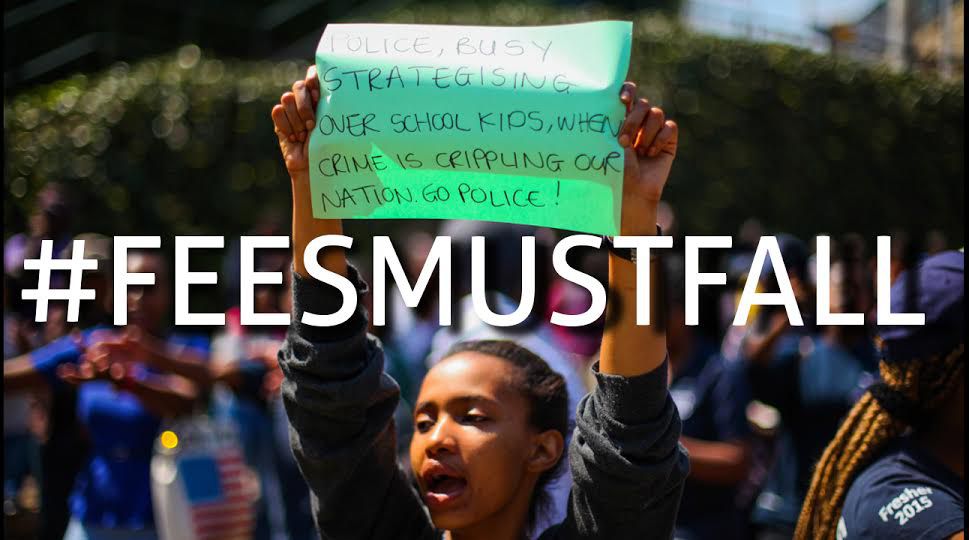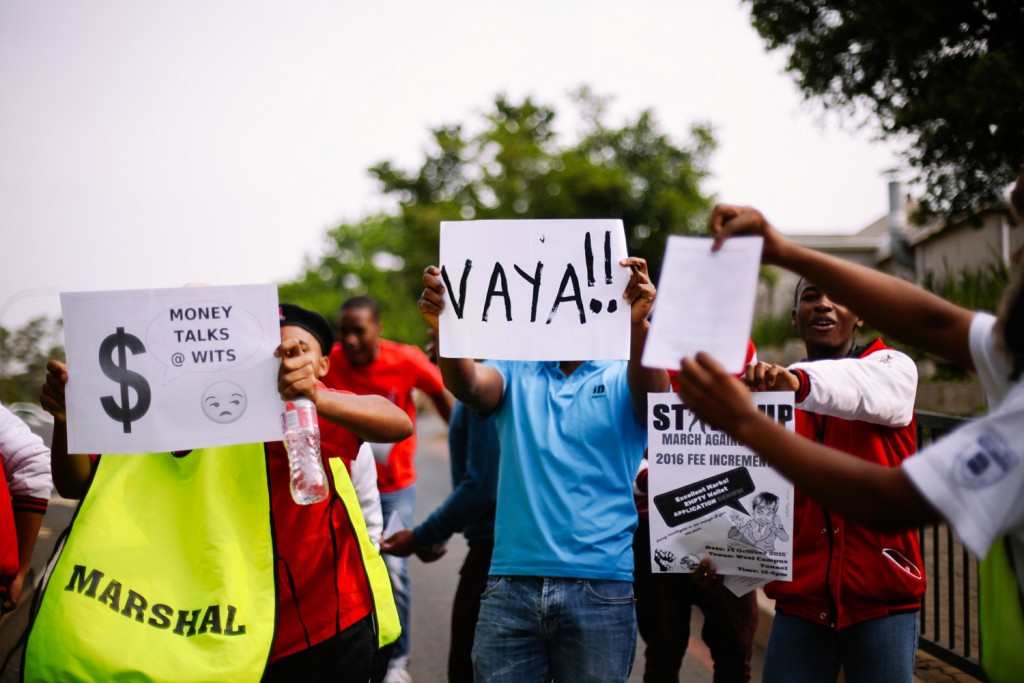You could hardly catch your breath last week with the #FeesMustFall protests in South Africa. For a while, after #RhodesFell, we feared that identity politics would swallow and spit out the loose agglomeration that was that movement (there is no national coordinating body; instead it has been led by a mix of campus organizations and the local or youth affiliations of nationalist or leftist parties). But the ability of students to find and develop “a theory to suit their times, capable of holding the contradictions of ‘born-free’ life, just as their parents practiced their theory of opposition to the realities of their lives” astonishes every day. Last Friday, South Africa’s President Jacob Zuma announced that there will be no fee increases for the next academic year, starting in January 2016. This was of course some kind of victory, but not all that students are asking. President Zuma’s announcement was silent about free education or the problem of outsourcing at universities. Neither did he address police brutality or the charges against students who were arrested. The students were not appeased.
Just read, for example, the Facebook post by Wits University SRC President Shaeera Kalla. She was quick to reassert the demand for free education and to link the struggles over fees to larger struggles over university governance and outsourcing: “Comrades we have neglected our mothers and fathers being abused at the hands of outsourced companies on our watch on our campus under our gaze. Every single day Mam Deliwe, Mam Zodwa, and Comrade Matthews and many others stood firmly with us against fee increases, what do we do for them?” We don’t know where these protests are going or whether #FeesMustFall has the potential to grow into a national movement beyond university campuses, That all depends on whether #FeesMustFall manages ideological and identarian politics, and, more importantly draws in other energies, organizations or groups outside universities into the struggle. What is clear, though, is that every time the government responds, the protesters up the ante. The young ones have been born.
In this eleven minute film, edited by Leila Dougan of our film unit, we’ve culled together images from the last week’s protests (the full list of credits come at the end of the film). Much of the coverage has focused on Johannesburg and Cape Town at the expense of provincial and “historical black universities.” This film lets students from Rhodes University, mostly women, articulate for themselves what is going on in this moment. Watch:
We Are Called Those Who Have Come*
By Thuto Thipe and Dan Magaziner
It was never just about Afrikaans.
They wore school uniforms in Soweto in June 1976, and they held signs. Many declaimed against the state’s mandate that classes previously taught in English be taught in Afrikaans. Thus did the popular mythology coalesce around the story that the Soweto Uprisings were only about Afrikaans. They never were. Soweto was about a changeover – the announcement of a generational shift in political practice. It was about a generation of students who, as another sign put it, were fed up with being beaten, fed up with be denied their dignity, fed up with being slaves to Bantu Education, the South African political economy and the apartheid state. It was never just about Afrikaans. It was about the future.

It was never just about a statue.
#RhodesMustFall was never just about a statue. At UCT earlier this year students tore through an earlier generation’s boundaries of the possible, to articulate a political vision situated in, and responsive to, the specific dynamics and needs of their time. The current generation of university students have, for the most part, grown up and been educated under democracy. The realities of continued poverty for most, growing inequality, and the resilience of white supremacy in South Africa have made the politics of liberalism less seductive for this generation. It was never just about a statue. Students have been, and are continuing to, call for the radical restructuring of political, social, financial and knowledge economies to reflect the lives and satisfy the needs of all. The political freedom won by earlier generations has allowed for an intellectual freedom that imagines politics beyond the party and is not afraid to make demands on the government and Constitution that has been so hallowed in our collective public life – just as the Class of ’76 imagined a politics beyond liberation movements and instead positioned themselves only as students, committed to the future, committed to the lives that they hoped to live.
The fact that the university was the birthplace of recent student action is essential to understanding the the character and form of these movements. Before Rhodes fell, students and professors sat and learned together in the Archie Mafeje room – named for a towering African intellectual – until the early hours of the morning. Professors from disciplines across the campus lectured and taught in the evenings and debate continued for hours. #RMF committees circulated texts by scholars from around the world, helping to frame analysis of past movements’ and regimes’ successes and failures and how best to integrate these lessons in the present. By militantly rejecting the dominant curriculum and teaching models that continue to put Europe and white South Africa at the centre of UCT’s academic life, students created the space in which they wanted to learn and explored a wealth of academic material that spoke to their realities and aspirations. The unique beauty of this process was the way that through this resistance and creative engagement they artfully produced new knowledge and fostered a new political consciousness. The statue, like Afrikaans, was a symbol. It was never just about the statue.
Now, students hold signs again. One, questioning, reads “1976?” Another, troubling, asks “Is my future my mother’s past?” Another, optimistically, promises, “my grandfather was a garden boy, my father is a garden boy (won’t happen to me) I wanna be a vet.” Most read simply #feesmustfall. It’s not just about fees; it’s not just about a hashtag.
Recent student action has captured public attention and the popular imagination because of how it has demonstrated the materiality of its theory. In public statements, student have shown how their experiences of financial exclusion, debilitating university debt and responsibility for extended families link to broader issues of political leadership, the organisation of the economy and the economic legacies of apartheid that haunt students trying to use education to escape poverty. By seamlessly moving between individual and structural analysis, and locating specific voices and narratives in the broader landscape, these movements have been able to animate the statistics to which the public has until recently seems desensitised. Through such analysis students in these movements, and their allies, have demonstrated the relationships between the financial exclusion of university students, universities’ outsourcing of ‘non-core’ workers, the gross under-representation of black academics in senior positions, and the massacre of mineworkers at Marikana.
In this political moment students are finding and developing a theory to suit their times, capable of holding the contradictions of ‘born-free’ life, just as their parents practiced their theory of opposition to the realities of their lives. The fearlessness with which the world has watched them confront these contradictions, facing head-on violence reminiscent of a bygone era, is sparking the idea that much more than fees may fall. So even as we salute Friday, 23 October 2015, when the fees fell, just as we cheered when Rhodes fell, just as we jeered when the National Party fell, we need to be with the students, reading, learning, thinking, practicing, planning for the struggles yet to come. It was never just about apartheid. It was about the future. Stay tuned.
*The title of this piece comes from the South African Student Movement newsletter, 1975.
++++++++++++
Originally from Joburg, Thuto Thipe was recently at the University of Cape Town as a student and a researcher. She studies history at Yale University. Dan Magaziner is an editor of Africa Is A Country.
>via: http://africasacountry.com/2015/10/we-are-called-those-who-have-come/





